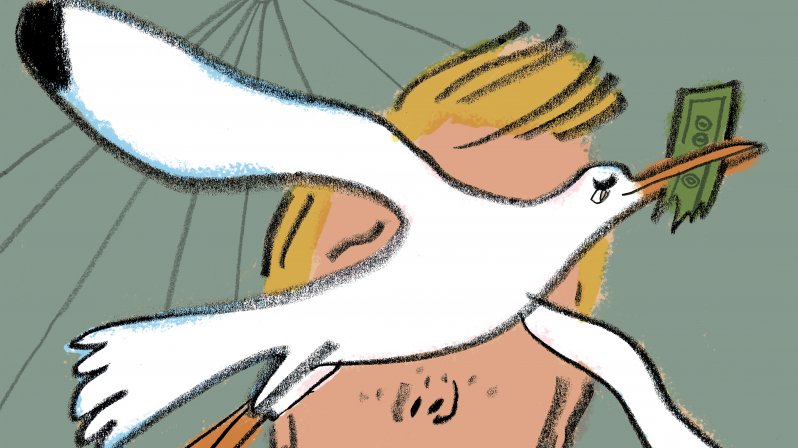Thousands of euros of wages missing–employee didn’t accept being underpaid
A café employee who had moved to Finland from abroad was paid too little in wages. Not content, the courageous employee claimed the unpaid amounts through the union and eventually through the courts.
She is young. She has moved to Finland from abroad. She doesn’t know how things work here, but needs a job.
These factors are often present in situations where an individual is exploited in working life by being underpaid.
This case involving Alina (not her real name) is unusual in that she took her underpayment case via the union all the way to the courts.
Alina speaks Finnish well. She is at home on maternity leave looking after her young child, and over a coffee talks about her “wonderful new job”. She laughs about how she now knows all about collective agreements. That wasn’t the case when she first moved to Finland from Russia.
She resigned from her café job having worked there for just over a year, because she wanted to switch to a busier workplace. Her employer announced there would be no severance pay and she could stop working. Alina, a PAM member, contacted the union. She estimated that her final pay with holiday compensation could come to something under 2000 euros.
Robust and clear grounds
The dispute landed on the desk of Toni Åman, an official in the Helsinki-Uusimaa regional office. Åman tried to mediate, but the employer didn’t respond.
Alina was surprised by the amount of unpaid wages Åman had calculated:
“The amount was much bigger! According to his calculations almost 7000 euros. That was a surprise”, Alina says.
The disputes that the union deals with mostly come from the hospitality sector (around 35 per cent). The sector includes many small employers that don’t belong to employers’ federations.
For example, last year the union dealt with over 800 disputes in total. In addition, the union’s legal aid resulted in 79 cases going to court or further mediation negotiations.
The case finally went to court, but that didn’t get Alina down. Åman states in the legal aid application that the employer has clearly paid wages below the collective agreement and not paid severance pay and related amounts due under the collective agreement.
“There are robust and clear grounds for the employee’s claims”, the application states.

Wage elements must be itemised
Alina’s hourly wage was 8 euros all the time, whereas under the collective agreement the correct hourly wage a couple of years ago would have been between 8.03 euros and 10.14 euros. She had basically been paid trainee’s wages all the time.
The employer’s defence stated that the 8 euro hourly wage wasn’t a trainee’s wage and that the employer had proposed this wage to the employee.
“The employee agreed to the employer’s proposal”, the defence states.
In Finland, wages are not something agreed between two parties. An employer can’t pay an employee less than what is in the collective agreement.
“The relevant collective agreement is binding legislation for both employees and employers. It cannot be undercut, even if the parties have agreed to do so in an employment contract”, Åman says.
”The relevant collective agreement is binding legislation for both employees and employers. It cannot be undercut, even if the parties have agreed to do so in an employment contract”
The collective agreement is a big protection for the employee, who is the weaker party when an employment contract is made.
Alina, why did you agree to low wages?
“This was my second job in Finland after I moved here from Russia. Anyway the pay was more than in my first job as a waitress. I had to keep my right to be here, so I had to work and the wages weren’t the most important bit. I was young and I didn’t know the system in Finland.”
“In Russia, bosses have a lot of power and workers can’t say no. In Finland, it seems bosses and workers aren’t so far apart. Here the government and legislation are important. The Finnish system is definitely much better.”
Alina’s unpaid wages:
Compensation for underpayment, i.e. correction of hourly wages 3071 e
Holiday compensations 1999 e
Wages for notice period 787 e
Public holidays 613 e
Waiting period wages for delayed severance payment 450 e
Total claims 6921 e
Raise the subject of wages
Toni Åman reflects on how employees sometimes end up being in underpaid jobs against their will.
“Employees may know they are being underpaid, but grit their teeth, thinking that they need the job ", Åman reflects.
He nonetheless encourages service sector workers to raise the subject of wages when they make an employment contract or during their employment:
“You could try to look into these things when the conditions are right and not after the job has ended, when sorting them out is more difficult”, Åman says.
“In any case employees are entitled to demand missing amounts even after their employment has ended, and the employer has to pay them.”

Correct wages are the employer’s responsibility
PAM’s legal counsel Julia Rintamo took Alina’s case to the district court in 2019. The outcome was that the court ordered the employer to pay the member all the unpaid amounts and the union’s legal costs.
“Fortunately the employee was brave enough to refer her case to the union. She got all her missing wages plus late payment interest, even after the employment had ended”, Rintamo says.
Rintamo also reflects on the way employees are often in a weaker negotiating position especially when job hunting and during their trial period. They need to take the work on offer due to financial realities and to avoid waiting periods.
“Although employees have an interest in getting the right wages, it is ultimately the employer’s responsibility.”
What underpayment means
- Underpayment means an employer pays an employee wages below the collective agreement level. In most sectors, even companies not affiliated with their employers’ federation must comply with the collective agreements for the sectors because they are generally binding. This also applies to service sectors.
- Underpayment is not a criminal offence by an employer. This tempts some employers to reduce their labour costs by offering wages below the collective agreement.
- An employer must pay an employee missing wages plus interest if the employee demands the wages due.
- Underpayment affects both Finnish and foreign workers. Underpayment is a particular problem in the hospitality sector and in long subcontractor chains.
- In its programme, the Finnish government has undertaken to prevent underpayment of wages.
- The position of SAK and PAM is that the law needs to be changed to prevent wage underpayment. They say the government should look into making wage underpayment a criminal offence as well as a number of other effective measures.
- The organisations think that labour inspectorates should be guaranteed means to intervene in worker exploitation. Further possibilities for victims of exploitation to get justice should also be considered.




